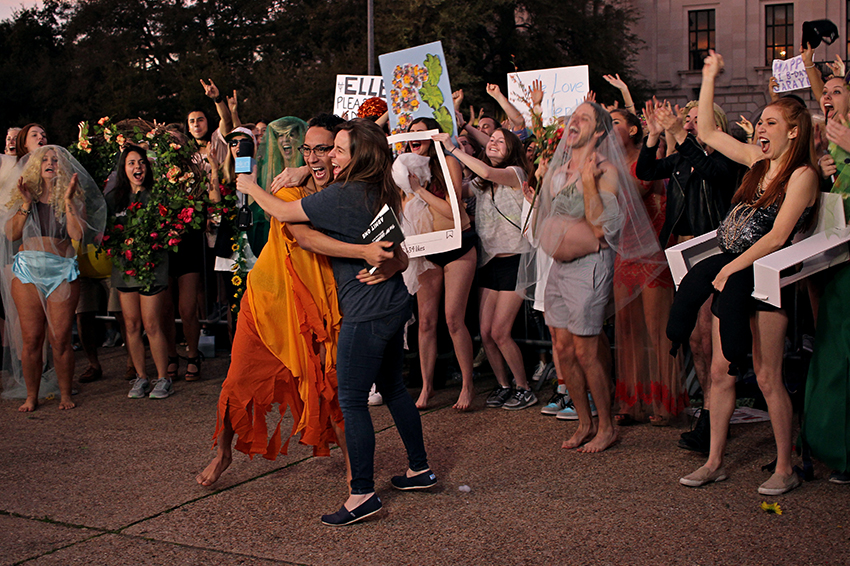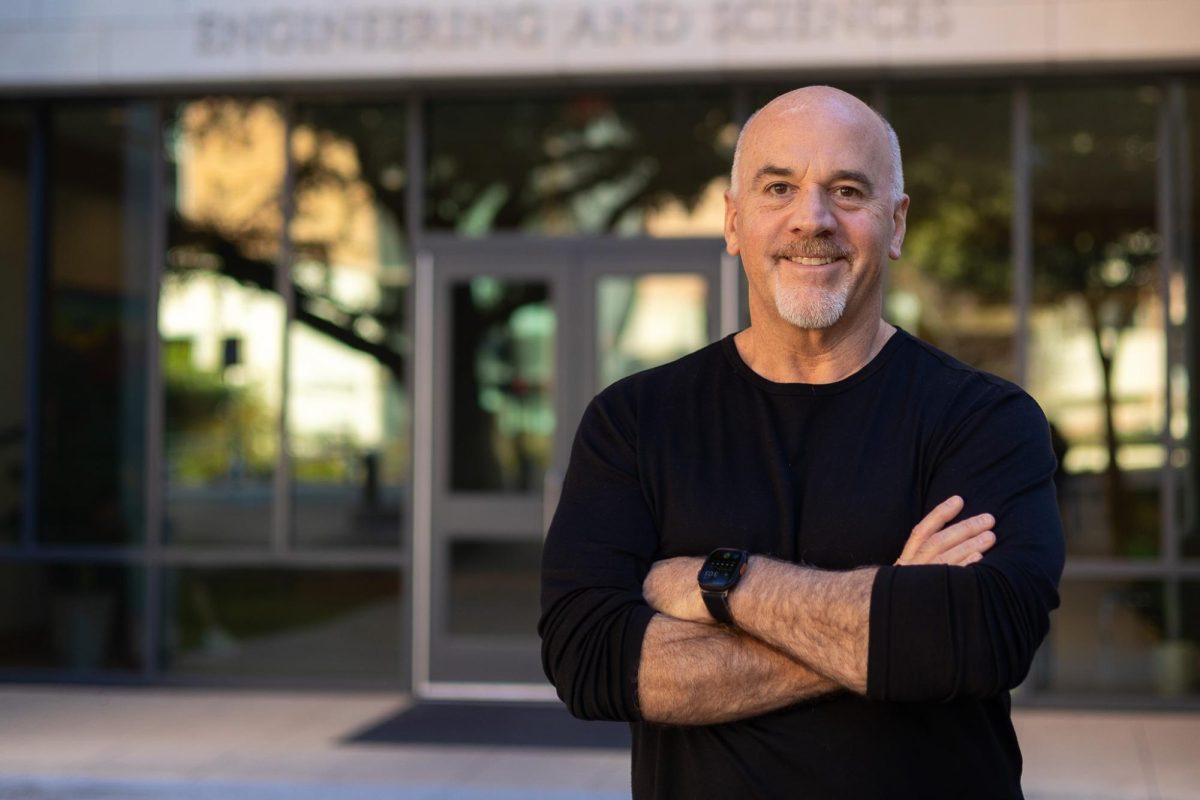Stabbing
On May 1 at 1:46 p.m., the UT Police Department responded to a call about an individual attacking a student with a large, Bowie-style hunting knife in the Speedway Plaza. Two minutes later, UTPD had detained biology junior Kendrex White. The attack left three students injured and one dead on the scene. The fatality victim was later identified as undergraduate studies freshman Harrison Brown. The three injured victims received treatment at Brackenridge Hospital. One victim, engineering student Stuart Bayliss, received extensive surgery for wounds he sustained during the attack. In the hours after the attack, rumors ran rampant on social media, many of which claimed White may have been targeting students with Greek life affiliations. UTPD and the Austin Police Department later found these rumors were not credible and that White may have been suffering mental health issues at the time of the attack.
Sigma Chi
On Sept. 11 last fall, the Sigma Chi fraternity house hired Edward Leroy Earls, a 44-year-old guard with the Austin-based security company Specialized Worldwide Protection, for a party at their house. According to an arrest affidavit, 18-year-old Daniel Magee was at the fraternity house at 2701 Nueces St. and was forcibly removed for unruly behavior. Police reported that Magee, who is not a UT student or a member of the fraternity, threatened to return to the party with an AK-47 rifle and “shoot up the place.” At 3 a.m., about 45 minutes later, Magee returned to the party with two of his roommates, pulled out a gun and fired in the direction of Earls, shooting him in the foot. Earls has since filed a $5 million lawsuit against the fraternity. Additionally, Liberty Corporate Capital, the fraternity house’s insurer, filed a lawsuit in April and is suing to get out of liability in protecting the Greek house in the incident.
Charlie Strong left the 40 Acres with a heavy heart and unfinished business after just three seasons at Texas — all of which resulted in more losses than wins. New Texas head coach Tom Herman raucously replaced him. Though the first few months of Herman’s reign resembled a quiet winter coupled with an even quieter national signing day, the spring months have been anything but calm. Herman took a sledgehammer to the Texas locker room ahead of the program’s renovation of the football facilities, which includes a flat-screen TV above each player’s locker. His hacking down of the locker room represents a much larger act of tearing up the entire program itself. Texas fans wanted change, and with Herman, they’re already getting it. As recruits continue to change their minds and commit to Herman and his staff, the “revolUTion” that Herman has initiated will only continue to inspire optimism among Longhorn nation.
Few things are certain in Texas Athletics in this era. Head coach Jerritt Elliott takes Longhorn volleyball deep into the postseason almost every year, and head coach John Fields puts together a group of golfers that consistently wins the Big 12 Championship. But this one is almost a sure-fire bet year in and year out: Texas winning a national championship in men’s swimming and diving under head coach Eddie Reese. Texas took home its national record 13th NCAA title this spring. The Longhorns have also won 38 straight conference championships during Reese’s reign. It’s become commonplace for Texas swimmers to appear in the summer Olympics every four years, and this current group of Longhorns continued that trend. Townley Haas, Joseph Schooling, Jack Conger, Clark Smith and former Longhorn Jimmy Feigen all swam in Rio de Janeiro last summer, and the first four also aided in Texas’ triumph at the 2017 national championship, too.
Posters
About a week after Inauguration Day, flyers appeared on kiosks and news boxes around campus targeting students for their political affiliations. Then on Feb. 13, anti-Muslim posters appeared on campus that encouraged students to imagine a “Muslim-free America.” The posters, mostly posted by a white supremacy group called American Vanguard, were removed by the Dean of Students office. According to the American Vanguard website, the group’s Texas branch placed posters at Texas State University, the University of North Texas and the University of Texas at Dallas as well. Other racist flyers titled “Ethical Lessons to Chinese” were found on campus April 2 detailing a “special” class for Chinese students to learn the integrity of intellectual property. Following the May 1 on-campus stabbing, racist flyers were found on campus depicting a caricature of a black man holding a knife with the words, “Around blacks … never relax.”
Inauguration/ Protests
In late November, Donald Trump was elected as the 45th President of the United States, leading to protests on campus and through downtown Austin less than 12 hours after Trump’s announced victory. More than 300 students congregated in front of the Tower and marched downtown for most of the day and into the night. More protests followed throughout the week, and anti-Trump graffiti was seen on campus. Similarly, college campuses around the country protested Trump’s victory. On Jan. 20, Trump’s inauguration day, the J20 walkout took place on UT campus. The protest was led by a coalition of students and faculty called the anti-Trump J20 organizing committee, a group that emerged in the wake of Trump’s presidential nomination, and lasted from noon to 1 p.m. at the Tower, after which the march moved through campus. One of the groups in the protest, the Revolutionary Student Front, handed out pamphlets describing the organization as a group of revolutionary anti-capitalist students who want to ensure education is in the hands of students. The march’s chants included, “Fuck Trump,” and “Fuck the police.”
Bake Sale
In order to protest UT’s policy toward affirmative action, the Young Conservatives of Texas held a bake sale in October that assigned the cost of baked goods to the customer’s race and gender. The bake sale set off a protest of over 300 students for several hours on the West Mall and made national news. Student Government wrote a resolution to disband YCT in November in response to the bake sale, but the group remained on campus due the opinions of several SG representatives who argued for YCT’s First Amendment right to freedom of speech, despite disagreeing with the bake sale’s message. The YCT bake sale remained a source of controversy throughout the spring semester, and UT’s affirmative action policy remains in place.
Ellen
On Feb. 7, hundreds of students participated in a Beyoncé costume competition at the Main Mall to win two tickets to the 2017 GRAMMYs provided by The Ellen DeGeneres Show. After students competed in various activities for several hours in their costumes, they were asked to recreate a photo from Beyoncé’s latest photoshoot, in which she announced her pregnancy with twins. Collin Wang, human development and family sciences sophomore, won a free trip to the GRAMMYs with a photo of him posing underwater in the Littlefield Fountain while wearing a flowy orange dress. The remaining four finalists won yearlong subscriptions to Hulu. UT spokesperson J.B. Bird said the Ellen Show crew was already in Texas for the Super Bowl and thought it would be fun to stop by UT-Austin.
SG Elections
The spring semester showdown for student body president and vice president was tight this year, as the Alejandrina Guzman-Micky Wolf ticket came out victorious over runner-ups Isaiah Carter and Sydney O’Connell by 793 votes in the run-off elections. The Guzman-Wolf campaign ran on a platform of representation and advocacy, whereas Carter-O’Connell were proponents for campus safety, inclusion and acceptance. In late February, the Carter-O’Connell campaign received a Class C violation for campaigning prior to the sanctioned campaign period in January. Carter and O’Connell sent emails three weeks before the campaign period to students they did not “personally and individually” know as mandated in the 2016 Election Code. A third ticket, comprising of Blake Burley and Robert Guerra, received a Class D violation a little over an hour before the first round of elections for failing to submit financial disclosures on time, resulting in disqualification.
Graffiti
A spray-painting spree began April 17 when the words “racist” and “rapist” were spray-painted on the stone pillars outside the Phi Gamma Delta (Fiji) fraternity house. The vandalism continued on several other fraternity houses including Kappa Alpha, Kappa Sigma and Pi Kappa Alpha for the next few days. Other phrases marking the buildings included “kill frat boys,” “nuke the frats,” and “off my campus.” President Gregory Fenves released a statement on April 19 saying the University is committed to working with local law enforcement and making UT a safe environment for all students. The graffiti sparked controversy from several students who said the focus should be on rape culture instead of vandalism.
In Memory of Nancy-Jane David
The words of “Amazing Grace” soared through the Main Mall on the night of April 19 in honor of Nancy-Jane David. David, a youth and community studies junior, was killed in a head-on collision with a school bus April 17 while driving a moped. According to a Austin Police Department press release, David was traveling southbound on Manor Road when her moped began to swerve into the northbound lanes and struck the bus head-on. David was pronounced dead on the scene. The privately-owned school bus was not carrying any passengers and did not belong to any school or school district, according to APD. More than 300 people gathered for a candlelit ceremony for David hosted by her sorority, Chi Omega, two days after the accident. David was a devoted Christian, a member of Silver Spurs and an assistant new member educator in Chi Omega.
Only one bill has been signed into law out of more than 6,000 filed bills during the 85th session of the Texas Legislature, which comes to a close May 29.
While bills can be introduced in both the House and Senate, they must first be passed by a committee and the full body of their chamber of origin before going through the same process in the opposite chamber. Almost 1,000 bills have been passed out of their chamber of origin so far, but only a little over 200 have been referred to committee in the opposite chamber.
Senate Bill 4
This controversial bill would allow officers to wquestion an individual’s immigration status when arrested or lawfully detained and has been passed by both the House and Senate and is awaiting approval from Gov. Abbott.
Abbott named Senate Bill 4 one of his priority pieces of legislation during his State of the State Address at the beginning of the session.
Abbott has not announced when he will sign the bill into law but indicated he was looking forward to it.
“I’m getting my signing pen warmed up,” Abbott said on Twitter Wednesday.
Bathroom bills
Known as the “bathroom bill,” Senate Bill 6 by Sen. Lois Kolkhorst, R-Brenham, received an all-night hearing at the beginning of March. SB 6 would require people to use bathrooms and changing facilities that match the sex on their birth certificates, which opponents say would discriminate against transgender individuals.
After being passed by the committee and by the full Senate a week later, the House has yet to take action on the bill.
House Bill 2899, by Rep. Ron Simmons, R-Carrollton, would prevent local municipalities from implementing policies that allow people to use the bathroom according to their gender identity.
The bill has been left pending in committee since the middle of April.
Sexual Assault
Several bills this session have set out to address the issue of sexual assault on college campuses. A survey conducted by the University of Texas System in which 15 percent of UT undergraduate women said they have been raped highlighted the gravity of this problem.
The survey revealed only 6 percent of sexual assault victims at UT-Austin reported their incident to the University while 32 percent told someone they trusted. Sen. Kirk Watson, D-Austin, introduced five bills which he hopes will increase reporting of these incidents by including anonymous reporting methods and providing amnesty for alcohol and conduct code violations.
The Senate has passed four out of the five bills.
Sen. Joan Huffman, R-Houston, also introduced a bill, SB 576, that would require University employees and officers of student organizations while acting in their official capacity to report any information on instances of sexual assault. The bill has faced opposition from several student groups including Voices Against Violence and Not On My Campus as well as Sen. Watson because they fear it would create a “chilling effect” on campuses.
Higher Education
Since the Legislature deregulated tuition in 2003, the cost of college education has risen by 147 percent and tuition continues to increases annually.
Tuition would freeze at its current rate for the 2018-19 and 2019-20 school years under Senate Bill 19 by Sen. Kel Seliger, R-Amarillo.
After the 2020 school year, institutions would only be able to raise the cost of tuition by one percent each year if they meet a series of performance standards. The Senate passed the bill at the beginning of April, but has not received a committee hearing in the House.
Seliger’s SB 2119 was approved by a Senate committee and would decrease the number of students an institution has to admit under the Top Ten Percent rule from 75 percent to 30 percent.
Guns
Under the current campus carry law, a person has to be 21 years of age and possess a concealed handgun license before carrying on campus.
House Bill 1911, by Rep. James White, R-Hillister, would allow people over the age of 21 to carry handguns without a license. White’s bill was passed out of a House committee after critics were assured the bill would not affect current campus carry legislation.
However, HB 375, by Rep. Stickland, R-Bedford, would alter campus carry by allowing persons over the age of 18 to carry handguns. By eliminating the licensing requirement, the age to carry a handgun on campuses would be lowered to 18. The bill has not been passed from committee.
Rep. Donna Howard, D-Austin, introduced a bill at the beginning of the session that would allow Texas public universities to opt out of the current campus carry law. Students Against Campus Carry, an organization at UT, helped Howard file the bill. However, the bill has not yet received a committee hearing.
Inauguration Protest by One Resistance
Thousands walked out into the streets to protest the election of President Donald Trump and his administration on Inauguration Day in January. The outcry followed an election result which shocked many, and Austin joined cities from across the nation in challenging Trump. Chanting, “He is not my president,” protesters marched late into the night to champion LGBT, Muslim, disabled, women and undocumented immigrant rights.
Women’s March
A wave of pink “pussy hats” swept the globe Jan. 21 as sister marches from all over advocated for women’s rights, including access to health care, reproductive rights and equal treatment in the workforce and society. According to The Associated Press, the main Women’s March in Washington, D.C. brought half a million attendees. More than 40,000 women and supporters gathered on the State Capitol’s south lawn to listen to former State Sen. Wendy Davis, D-Fort Worth, and current Congressman Lloyd Doggett, D-Austin, speak on women’s rights. Some women, however, said the Women’s March failed to represent anti-abortion rights views.
No Ban, No Wall Rally
Thousands joined together in downtown Austin to protest President Donald Trump’s executive orders Feb. 25. One order banned immigrants from seven middle eastern countries from entering the U.S. and the other was a directive to start construction on the border wall. Protesters in other major cities voiced their shock and anger at the controversial decisions made by the new president.
Day Without Immigrants
Undocumented immigrants went on strike to protest State Senate Bill 4, which would outlaw “sanctuary cities,” cities with protective policies for undocumented immigrants. Mom and pop stores closed as well as some local Austin chains, including Home Slice Pizza, as families, workers and students demonstrated what society would look like if they were removed.
Travis County Sheriff Sally Hernandez and Gov. Greg Abbott feud
Travis County Sheriff Sally Hernandez, who was sworn in last year, enacted a policy starting Feb. 1 to no longer allow Immigration Customs and Enforcement agents to detain inmates in local jails without warrants. Federal ICE agents would be required to obtain warrants from a judge to detain an inmate suspected of being undocumented under the new policy, a policy Gov. Greg Abbott said is unlawful and goes against federal immigration law enforcement. Abbott then withheld $1.5 million in criminal justice grants from Travis County, spurring outrage from those advocating for undocumented immigrants’ rights. The conflict sparked debate over whether Austin qualifies as a sanctuary city. Hernandez, Austin Police Chief Brian Manley and Austin Mayor Steve Adler have said the Sheriff’s policy is to maintain trust between local law enforcement and the undocumented immigrant community, who fear being detained for low-profile crimes by local law enforcement. Recently Adler said based on what U.S. Attorney General Jeff Sessions told him, Austin does not qualify as a sanctuary city because it does not violate any federal law under Hernandez’s policy.
U.S. Rep. Beto O’Rourke, D-Austin, announcing he will challenge Sen. Ted Cruz in the primaries
A low-profile Democratic congressman from El Paso, U.S. Rep. Beto O’Rourke, announced in March he will challenge Sen. Ted Cruz, R-Texas, in the 2018 primaries. Political analysts say it is long road ahead for the underdog vying to take a conservative leader’s seat in the Senate. O’Rourke has made stops around various cities in Texas, including Austin, to build up support around his campaign.















